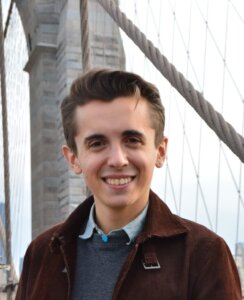At a singles event celebrating the Jewish day of love, compatibility means agreeing on Israel and religious practice
A recent Tu B’Av party on the Upper West Side saw singles seeking out soulmates with like-minded views
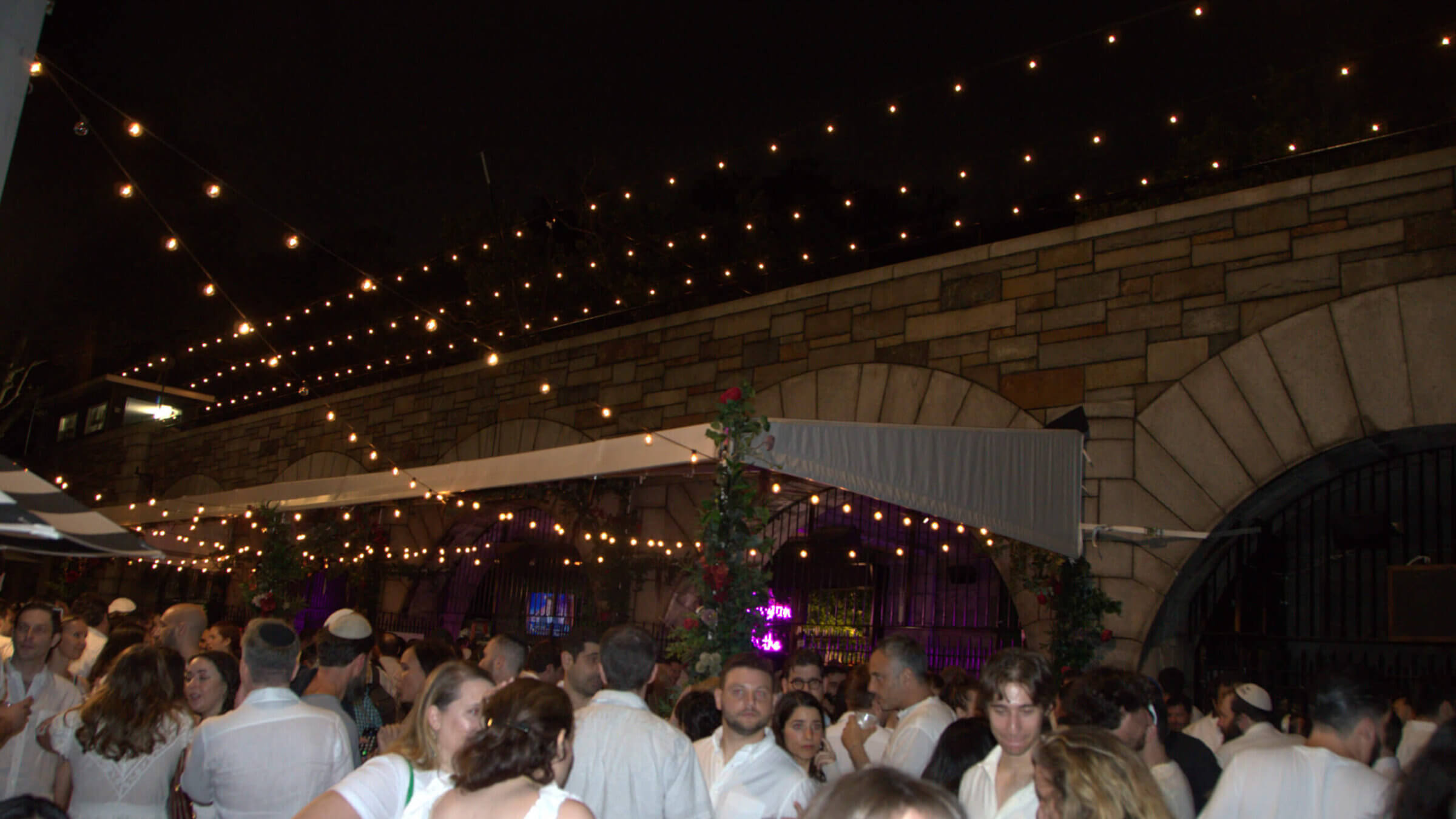
Nearly a thousand Jewish singles attended this year’s Tu B’Av White Party in Riverside Park Photo by Samuel Eli Shepherd
At the first Tu B’av party in Riverside Park since Oct. 7, celebrating the Jewish day of love, the coupon code for singles to register in advance was “Israel.”
Security guards scanned guests’ bags and pockets at the entrance to the Ellington in the Park outdoor restaurant Monday night. Once singles made it through security barrier, they received stickers with their first name and a number, a pen and a piece of paper so they could write down the numbers of partners with whom they sparked a connection.
As the night went on, hundreds of singles spilled out of the bar onto the hillside dance floor, careful not to slosh greenish-yellow cocktails on each other’s white dresses and button-downs. Next to the Hudson River, bachelors bounced to Hebrew music with their Magen David necklaces and Israel Defense Forces dog tags on full display.
Jewish humor website Bangitout.com have been hosting their annual “Tu B’av White Party” for nearly two decades, where Jewish singles dress in all-white clothing and try to make a match. Organizers said this year’s event saw around one thousand guests: a turn-out not seen since prior to the pandemic, and a near record for the company.
“We had 700 register online and I would say close to 300 walk-ins,” said Seth Galena, co-founder of the website. Galena has been organizing yearly Tu B’Av “White Parties” with his brother since they were in their twenties.
Galena, now 47, said that people wear white on Tu B’Av because Jewish law considers it to be one of the two most joyous days in the Hebrew calendar. In the Talmud, Galena said, “they would ask that all the Jewish people go to the fields and find their partner and dance in the fields.” The women all wore white so everyone would be treated equally, regardless of their class or social status.
There are no Talmudic fields in Manhattan. So, for the past 19 years, Galena and his friends have hosted singles parties in outdoor venues across the Upper West Side. Close enough.
While the Forward infiltrated the 2017 Tu B’Av party, the event in 2024 reflected a much more serious mood among singles searching for love.
In the aftermath of Oct. 7, more singles expressed a desire to find partners who are also Jewish, and several eligible bachelors and bachelorettes said finding someone who matched their views on the Israel-Hamas war has become a dating must.
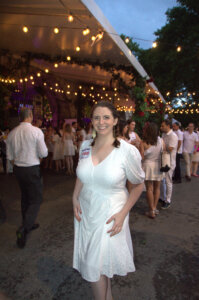
“Eventually I want to find my bashert,” said Debra Fricano, 35, an educator and incoming Rabbinical student at the Academy For Jewish Religion.
Fricano lives on the Upper East Side and describes herself as “pluralistic.” She said she prefers in-person dating events to dating apps, where people can be overly picky.
“This is not a J-swipe, swipe left or right,” Fricano said, referring to the Jewish dating app. “People have made an effort to show up here, and different types of connections can be made here. I’m even here to reconnect with friends.” she said.
Fricano said that Oct. 7 impacted her career trajectory. After seeing how antisemitism affected children at the synagogue where she worked, she decided to finally take the leap in a long-considered dream of becoming a rabbi.
“After October 7th, I feel a revived commitment to serving the whole spectrum of the Jewish peoplehood and keeping us together, especially in the face of antisemitism,” Fricano said.
And while Fricano has dated both Jews and non-Jews in the past, her commitment to rabbinical school has also inspired her to limit her dating pool to just other Jews going forward.
“I want someone to be a partner in raising proud Jewish kids,” she explained.
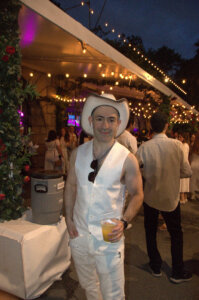
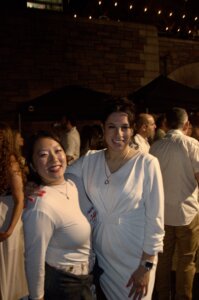
The majority of party-goers I spoke to Monday identified as Orthodox or modern Orthodox. Most also considered themselves politically conservative and expressed strong support for the state of Israel.
“I’m very right-wing,” said Alexander Shapiro, 39, who wore a large cowboy hat and long AirPods in his ears the entire time he spoke with me. Shapiro was born in Ukraine and later moved to Tel Aviv. He said that support for Israel trumped many other priorities in a partner.
“Do they necessarily have to be Jewish? No,” said Shapiro. “But do they have to have the same views as me? Yes.”
Suzanne Jacob, 34, who attended the singles mixer with her friend Yaffa Favi, 28, also considered political alignment on Israel a priority.
Other singles said that commitment to religiosity, not necessarily support for Israel, were the bottom line when seeking out a partner.
“The most important thing in Torah is to create a family,” said Eduard Kunin, 31, who works in finance. “To create a Jewish family with Jewish tradition.”
Kunin is a recent immigrant from Ukraine, and he identified there as a “traditional Jew.” He said there was no exact equivalent in terms of American denominations, but he ultimately wants a partner who is serious about Judaism.
“It’s very important to me that she keeps some important celebrations,” said Kunin. “That she knows where the shul is in her country, in her city. That she knows what is Pesach. That she knows what is Yom Kippur,” he said.
As the night went on, singles danced up close with each other underneath string lights and black and white umbrellas. From the stairs above the restaurant, the guests looked like a gala of frum mimes clustered together next to the Hudson River.
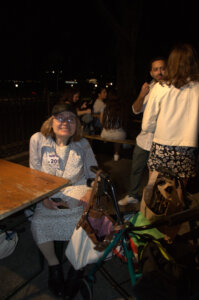
Sandra Liebling, 74, attended with her daughter Miriam, and her 19-year-old grandson. She sat by the barbecue eating a bowl of kosher brisket and rice, catered by the event.
“Heritage is very important,” said Liebling. She explained that she convinced her daughter, a single mom, to come out that evening to meet a Jewish partner. “We have to keep the Jewish people alive,” she explained.
Liebling uses a walker, and said the event was difficult to access. Still, she explained that trekking out to the party was worth it for the sake of supporting her daughter. She pointed to a pendant around her neck that she purchased in Israel engraved with a Hebrew marriage blessing.
“God to be with you at all times, and for there to be peace,” she read.
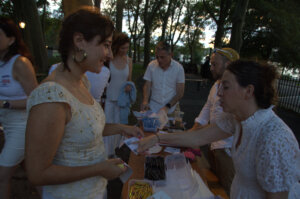
Speaking from their offices the next day, the event organizers reflected on the meaning of their yearly Tu B’Av White Parties. To these men, the party was more than just an opportunity for New Yorkers to schmooze and drink booze.
“My sister met her husband at this party,” said Seth Galena. “At her wedding, I said, ‘If we only made this party, just for her to meet her husband …’” He paused, holding back tears. “‘Dayenu, that would’ve been worth it.’”
Co-organizer Jordan Hiller said the mixer had taken on extra resonance this year in the wake of protests in the neighborhood regarding the Israel-Hamas war. In the past few months, they said some media outlets have portrayed the Upper West Side as a place where it is dangerous to be publicly Jewish or supportive of Israel.
Hiller said the party’s success countered the media misconception that New York Jews were scared or siloed. “You see a thousand Jews getting together, openly, proud, out there, mingling,” he said. “The point is it can be done, and here’s proof.”



